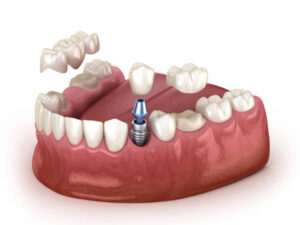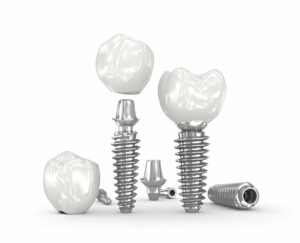Before diving into the pain aspect, let’s understand what dental implants entail. Dental implants are surgical components that interface with the bone of the jaw or skull to support a dental prosthesis, such as a crown, bridge, denture, or facial prosthesis. They serve as a long-term solution for missing teeth, providing a blend of functionality and aesthetics that other options might not offer.
Also Read: Ideal Age for Dental Implants: A Guide
The Procedure: An Overview
The dental implant process involves several steps, each playing a crucial role in the overall success of the treatment:
- Consultation and Planning: This initial phase involves thorough dental exams, including X-rays or 3D images, and discussing the patient’s medical history.
- Implant Placement: A titanium post is surgically placed into the jawbone, acting as a substitute for the tooth root.
- Healing Process: Known as osseointegration, this phase allows the implant to fuse with the jawbone, creating a strong foundation.
- Abutment Placement: Once healing is complete, a small connector is attached to the post to securely hold the new tooth.
- Artificial Tooth Placement: Finally, the artificial tooth (crown) is attached to the abutment, completing the restoration process.
Addressing Pain Concerns
During the Procedure
Modern dental implant procedures are performed under local anesthesia, ensuring that the area is numb and the patient feels no pain during the surgery. Some patients may opt for sedation dentistry to ease anxiety and discomfort. According to patient testimonials, the experience is often described as less discomforting than anticipated, with many comparing it to a simple tooth extraction.
Post-Procedure Experience
Post-surgical discomfort is normal and can include swelling, bruising, minor bleeding, and pain at the implant site. However, these symptoms are typically manageable with prescribed medications and tend to subside within a few days. It’s crucial for patients to follow their dentist’s aftercare instructions to mitigate any discomfort and facilitate a smooth healing process.
Also: The Lifespan of Single Tooth Implants
Mitigating Pain and Ensuring Comfort
Dentists employ various strategies to ensure patient comfort and minimise pain throughout the dental implant process:
- Pre-Operative Assessment: Identifying and addressing any potential issues before surgery.
- Effective Pain Management: Utilising appropriate anesthesia and prescribing pain relievers for post-operative care.
- Post-Operative Support: Offering detailed aftercare instructions and follow-up appointments to monitor healing.
Conclusion
While the thought of dental implants might be daunting to some, understanding the procedure and what to expect can alleviate fears related to pain. Advances in dental technology and anesthesia have made the process more comfortable than ever, with the focus firmly on patient care and pain management. At Aberdeen Dental Implant Clinic, the emphasis is on ensuring that each patient receives a tailored experience that addresses their unique concerns and needs. Should you consider dental implants, discussing your concerns with a dental professional at Aberdeen Dental Implant Clinic can provide personalised insights and reassurance tailored to your specific requirements.




